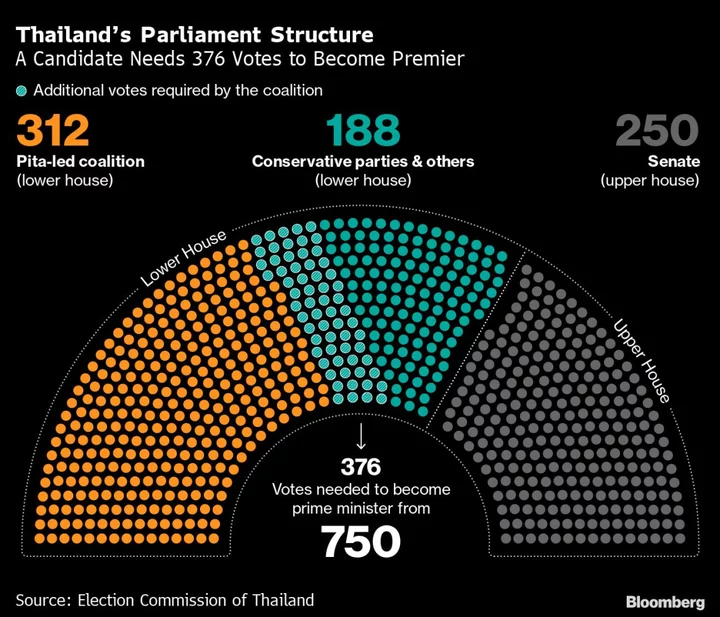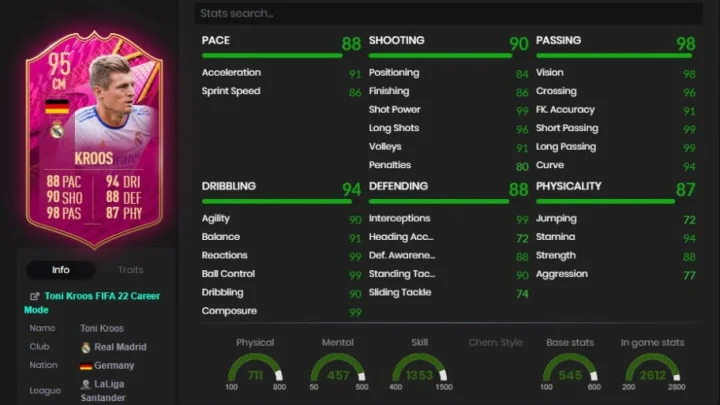One month after Thailand’s pro-democracy parties won the election that ended nearly a decade of military-backed rule, hurdles are mounting for the winning coalition and its prime minister candidate Pita Limjaroenrat to take power.
As the leader of the Move Forward party tries to rally support for his coalition, a saga around his alleged ownership of media shares has gripped the nation, stoking speculation about whether the 42-year-old Harvard graduate will be disqualified for breaching election rules.
The dispute comes on top of Pita’s struggle to get members of the military-appointed Senate to support his premiership, with his alliance still short of the 376 votes needed from both houses of parliament to choose the next leader. At the same time, Pita has stuck to a campaign vow to try to amend Article 112 of Thailand’s criminal code, which punishes criticism of the king and other top royals by up to 15 years in prison. That stance has riled the royalist military and political establishment.
Here’s what you need to know about this saga:
What’s it all about?
Just days before Thailand’s election, political activist Ruangkrai Leekitwattana lodged a complaint with the Election Commission, seeking a Constitutional Court ruling on whether Pita had violated a provision of the Thai charter that forbids anyone who hold shares in or owns a media company from seeking to take part in an election to parliament.
Ruangkrai alleged that Pita held 42,000 shares in long-defunct broadcaster ITV Pcl and argued that such ownership was grounds for disqualification.
In response, Pita downplayed the issue, calling the complaint a politically motivated effort to hinder Move Forward’s rise. He said he was legally prepared to clarify the issue if summoned by the Election Commission. Pita also said he didn’t own the shares but only managed them as part of an estate left behind by his father, who passed away in 2006.
How has Pita reacted recently?
After Pita’s party beat pre-election expectations and won the most seats in the May 14 vote, Ruangkrai didn’t stop. He kept filing what he claimed to be more evidence that showed Pita violated the charter. Meanwhile, the Election Commission remained largely silent on whether it would accept or dismiss the complaints.
Last week saw a shift in Pita’s tone when he announced he had transferred the ITV shares to another family member. That move, he said, wasn’t an admission of guilt but meant to pre-empt what he called efforts to “revive” ITV to be an active media company in order to disqualify him.
Pita also insisted ITV couldn’t be considered a media company since it hasn’t operated since 2007, when its government contract was ended and it lost access to its radio frequency.
Is ITV a media company?
Debate is still raging over this question. ITV started its television operation in 1995 under a 30-year government contract but went into a legal battle with the Prime Minister’s Office in 2002, causing its contract to be terminated in 2007.
A separate legal battle over the termination of the contract has continued to this day. In its 2022 annual report, ITV said it “used to” operate a television station and “had to cease” that operation in 2007. The company was de-listed from the Stock Exchange of Thailand in 2014.
Most legal experts have said ITV’s annual reports and financial documents showed the company is not in operation and not deriving revenue from media operations, and therefore can’t still be considered a media business. But Pita’s rivals say that as long as the company hasn’t formally closed, then it is still a media venture.
What are the latest developments?
In the latest twist, local television show 3 Miti News had broadcast a report showing discrepancies between what was said at ITV’s annual general meeting in April and what was written in the subsequent meeting minutes. According to the publicly-available meeting report, one shareholder asked if ITV was operating in the media space and Kim Siritaweechai, the president at parent company Intouch Holdings who chaired the meeting, said yes.
However, parts of the video recording of the meeting, which the local outlet said it obtained from a shareholder, showed Kim also saying no and citing the ongoing legal battle as a reason. Intouch Holdings has since told the stock exchange it will “investigate the facts of these issues.”
Later on Monday, Move Forward’s secretary-general claimed foul play, alleging an intricate plot to thwart Pita that began before the election and involving what he called a falsification of the ITV meeting report. He pointed to “irregularities” in ITV’s 2022 financial statement that differed from submissions in previous years by stating its business as media and its product as advertising — a move made on the same day as Ruangkrai’s original complaint.
What has the Election Commission said?
Last week, local media reported that the six-member Election Commission threw out Ruangkrai’s media shares complaint alongside two others and instead said it would pursue its own probe to determine whether Pita had applied to take part in the May 14 election despite knowing he was not eligible. If found guilty, Pita could face a penalty of as much as 10 years in prison and a ban from politics for 20 years.
What does this mean for Pita and his coalition?
It’s not clear if the Election Commission will formalize a case against Pita after its investigation. Cases under Article 151 of Thailand’s election law are tried in criminal courts, not the Constitutional Court. Those procedures can take months or years, and the case could be dismissed at a number of different stages before it even reaches the judges.
That means that Pita could be certified as a member of parliament by next month and still be nominated by his coalition to serve as prime minister.
For now, Pita’s potential disqualification can’t be ruled out. Another article in the constitution allows the Election Commission or a group consisting of 10% of lawmakers in either chamber to ask the nation’s top court determine whether a particular legislator is ineligible to hold office and to order his or her tenure terminated.
That’s a low bar in the 500-member lower house, where the conservative parties now hold 188 seats. Such a petition can be submitted as soon as a new house speaker is chosen and before the selection of prime minister.
Pita’s troubles are growing. He has yet to muster enough support to become prime minister while he faces potential legal challenges that could keep him from ever rising to or holding on to power.
It doesn’t help that Thailand has a history of disqualifying lawmakers and disbanding pro-democracy parties. Move Forward’s predecessor, Future Forward was disbanded after the 2019 election. Its leader Thanathorn Juangroongruangkit, then prime-minister candidate of the opposition bloc, was disqualified after the Constitutional Court found him guilty of holding media shares on the date he registered his candidacy.
Pita reiterated on Tuesday that Move Forward has anticipated every scenario to block his path to power and is prepared to fight any challenges.
“We have prepared evidence and legal arguments and we’re ready to fight when we really have to enter the process,” said Pita.









